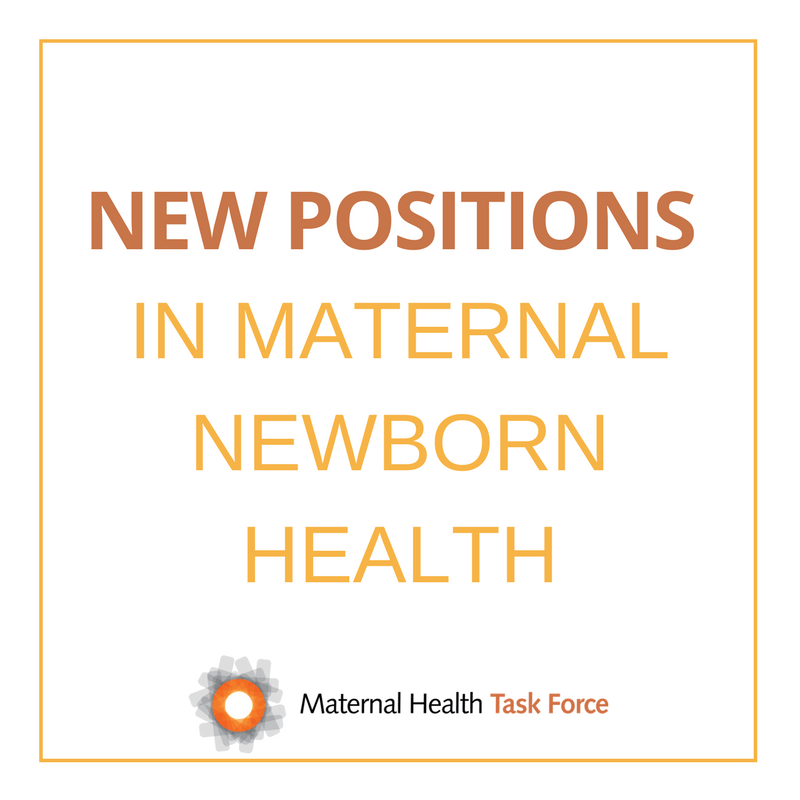Maternal Health Task Force
The Maternal Health Task Force strives to create a strong, well-informed and collaborative community of individuals focused on ending preventable maternal mortality and morbidity worldwide.
677 Huntington Avenue
Boston, MA 02115
Blog
-
New Positions in Maternal Newborn Health
Interested in a position in reproductive, maternal, newborn, child or adolescent health? Every month, the Maternal Health Task Force rounds up job and internship postings from around the globe. In this month’s roundup, we are featuring positions at CARE, Save the Children, EngenderHealth and other organizations!…read more

-
From Local Action to National Results: How Community Health Workers Are Helping to Improve Maternal Health in Rwanda
One strategy that Rwanda has used to improve maternal health is engaging voluntary community health workers known as Animatrice de Santé Maternelle (ASMs). ASMs provide several services including health promotion and education, monitoring and reporting of maternal and newborn health indicators and accompaniment of pregnant women to health facilities…read more
-
From the Archives | Giving Birth Without Clean Water
World Water Week is a reminder to the public health community that more than 600 million people around the globe do not have a safe water source nearby. Water, sanitation and hygiene play a crucial role in improving maternal health outcomes during pregnancy, delivery and postpartum…read more
-
The Best Available Tools to Measure Women’s Childbirth Experiences
Understanding women’s experiences during childbirth is an important component of addressing issues related to the quality of maternal health care. However, measuring the quality of maternal health care, and specifically women’s experiences, is notoriously difficult. A recent paper reviewed existing measurement tools that aim to capture women’s childbirth experiences and offered recommendations…read more
-
What Is the Most Effective, Low-Cost Method for Inducing Labor in Women With Pre-Eclampsia?
A group of researchers from the University of Liverpool, Gynuity Health Projects and the Government Medical College, Nagpur recently conducted a randomized controlled trial to compare the efficacy, safety and acceptability of two low-cost methods for labor induction among women with pre-eclampsia…read more
-
Maternal and Women’s Health, Two Years In: Measuring Progress Towards Meeting the SDGs
On 14 July 2017, as part of the Advancing Dialogue on Maternal Health Series, providers, advocates, researchers and policymakers gathered at the Wilson Center to discuss measuring progress towards improving maternal health under the Sustainable Development Goals…read more
-
Profiles of Maternal and Newborn Health in Humanitarian Settings: Conflict in Syria
Women and children living in conflict or post-conflict settings are particularly vulnerable. The collapse of health infrastructure, issues related to gender-based violence and a lack of access to high quality health care—particularly during pregnancy and delivery—is having devastating consequences for maternal and newborn health in Syria…read more
-
Profiles of Maternal and Newborn Health in Humanitarian Settings: 2015 Nepal Earthquake
Women and children often bear the greatest burden in the wake of natural disasters, especially when they occur in low-resource settings. Part two of our three-part series on humanitarian settings explores the effects of the 2015 Nepal earthquake on maternal and newborn health…read more
-
Profiles of Maternal and Newborn Health in Humanitarian Settings: Ebola Virus Outbreak
Humanitarian crises—defined as events or series of events that represent a critical threat to the health, safety, security or wellbeing of a community or other large group of people—present unique challenges for women and children. This three-part series will explore maternal and newborn health issues through the lens of three humanitarian settings, starting with an example of an infectious disease outbreak…read more
-
How Researchers Used Behavioral Economics to Help Women Decide Where to Give Birth in Nairobi, Kenya
The Maternal Health Task Force’s Sarah Hodin interviewed Jessica Cohen and Margaret McConnell about their study, “Precommitment, cash transfers, and timely arrival for birth: Evidence from a randomized controlled trial in Nairobi Kenya,” that explored how behavioral economics can be used to improve maternal health…read more